- Home
- Salman Rushdie
Joseph Anton: A Memoir: A Memoir Page 2
Joseph Anton: A Memoir: A Memoir Read online
Page 2
The service ended and the journalists pushed their way toward him. Gillon, Marianne and Martin tried to run interference. One persistent gray fellow (gray suit, gray hair, gray face, gray voice) got through the crowd, shoved a tape recorder toward him and asked the obvious questions. “I’m sorry,” he replied. “I’m here for my friend’s memorial service. It’s not appropriate to do interviews.” “You don’t understand,” the gray fellow said, sounding puzzled. “I’m from The Daily Telegraph. They’ve sent me down specially.”
“Gillon, I need your help,” he said.
Gillon leaned down toward the reporter from his immense height and said, firmly, and in his grandest accent, “Fuck off.”
“You can’t talk to me like that,” said the man from the Telegraph. “I’ve been to public school.”
After that there was no more comedy. When he got out onto Moscow Road there were journalists swarming like drones in pursuit of their queen, photographers climbing on one another’s backs to form tottering hillocks bursting with flashlight. He stood there blinking and directionless, momentarily at a loss to know what to do.
There didn’t seem to be any escape. There was no possibility of walking to the car, which was parked a hundred yards down the road, without being followed by cameras and microphones and men who had been to various kinds of school, and who had been sent down specially. He was rescued by his friend Alan Yentob of the BBC, the filmmaker and senior executive whom he had first met eight years earlier, when Alan was making an Arena documentary about a young writer who had just published a well-received novel called Midnight’s Children. Alan had a twin brother but people often said, “Salman’s the one who looks like your twin.” They both disagreed with this view but it persisted. And today might not be the best day for Alan to be mistaken for his not-twin.
Alan’s BBC car pulled up in front of the church. “Get in,” he said, and then they were driving away from the shouting journalists. They circled around Notting Hill for a while until the crowd outside the church dispersed and then went back to where the Saab was parked.
He got into his car with Marianne and suddenly they were alone and the silence weighed heavily on them both. They didn’t turn on the car radio, knowing the news would be full of hatred. “Where shall we go?” he asked, even though they both knew the answer. Marianne had recently rented a small basement apartment in the southwest corner of Lonsdale Square in Islington, not far from the house on St. Peter’s Street, ostensibly to use as a work space but actually because of the growing strain between them. Very few people knew of this apartment’s existence. It would give them space and time to take stock and make decisions. They drove to Islington in silence. There didn’t seem to be anything to say.
Marianne was a fine writer and a beautiful woman, but he had been discovering things he didn’t like.
When she had moved into his house she left a message on the answering machine of his friend Bill Buford, the editor of Granta magazine, to tell him that her number had changed. “You may recognize the new number,” the message went on, and then, after what Bill thought of as an alarming pause, “I’ve got him.” He had asked her to marry him in the highly emotional state that followed his father’s death in November 1987 and things between them had not remained good for very long. His closest friends, Bill Buford, Gillon Aitken and his American colleague Andrew Wylie, the Guyanese actress and writer Pauline Melville, and his sister Sameen, who had always been closer to him than anyone else, had all begun to confess that they didn’t like her, which was what friends did when people were breaking up, of course, and so, he thought, some of that had to be discounted. But he himself had caught her in a few lies and that had shaken him. What did she think of him? She often seemed angry and had a way of looking at the air over his shoulder when she spoke to him, as if she were addressing a ghost. He had always been drawn to her intelligence and wit and that was still there, and the physical attraction as well, the falling waves of her auburn hair, her wide, full-lipped American smile. But she had become mysterious to him and sometimes he thought he had married a stranger. A woman in a mask.
It was midafternoon and on this day their private difficulties felt irrelevant. On this day there were crowds marching down the streets of Tehran carrying posters of his face with the eyes poked out, making him look like one of the corpses in The Birds, with their blackened, bloodied, bird-pecked eye sockets. That was the subject today: his unfunny Valentine from those bearded men, those shrouded women, and the lethal old man dying in his room, making his last bid for some sort of dark, murderous glory. After he came to power the imam murdered many of those who brought him there and everyone else he disliked. Unionists, feminists, socialists, Communists, homosexuals, whores, and his own former lieutenants as well. There was a portrait of an imam like him in The Satanic Verses, an imam grown monstrous, his gigantic mouth eating his own revolution. The real imam had taken his country into a useless war with its neighbor, and a generation of young people had died, hundreds of thousands of his country’s young, before the old man called a halt. He said that accepting peace with Iraq was like eating poison, but he had eaten it. After that the dead cried out against the imam and his revolution became unpopular. He needed a way to rally the faithful and he found it in the form of a book and its author. The book was the devil’s work and the author was the devil and that gave him the enemy he needed. This author in this basement flat in Islington huddling with the wife from whom he was half estranged. This was the necessary devil of the dying imam.
Now that the school day was over he had to see Zafar. He called Pauline Melville and asked her to keep Marianne company while he made his visit. She had been his neighbor in Highbury Hill in the early 1980s, a bright-eyed, flamboyantly gesticulating, warmhearted, mixedrace actress full of stories, about Guyana, where one of her Melville ancestors had met Evelyn Waugh and shown him around and was probably, she thought, the model for Mr. Todd, the crazy old coot who captured Tony Last in the rain forest and forced him to read Dickens aloud forever in A Handful of Dust; and about rescuing her husband, Angus, from the Foreign Legion by standing at the gates of the fort and yelling until they let him out; and about playing Adrian Edmondson’s mum in the hit TV comedy series The Young Ones. She did stand-up comedy and had invented a male character who “became so dangerous and frightening that I had to stop playing him,” she said. She wrote down several of her Guyana stories and showed them to him. They were very, very good, and when they were published in her first book, Shape-Shifter, were widely praised. She was tough, shrewd and loyal, and he trusted her completely. She came over at once without any discussion even though it was her birthday, and in spite of her reservations about Marianne. He felt relieved to be leaving Marianne behind in the Lonsdale Square basement and driving by himself to Burma Road. The beautiful sunny day, whose astonishing wintry radiance had been like a rebuke to the unbeautiful news, was over. London in February was dark as the children made their way home. When he got to Clarissa and Zafar’s house the police were already there. “There you are,” said a police officer. “We’ve been wondering where you’d gone.”
“What’s going on, Dad?” His son had a look on his face that should never visit the face of a nine-year-old boy. “I’ve been telling him,” Clarissa brightly said, “that you’ll be properly looked after until this blows over, and it’s going to be just fine.” Then she hugged him as she had not hugged him in five years, since their marriage ended. She was the first woman he had ever loved. He met her on December 26, 1969, five days before the end of the sixties, when he was twenty-two and she was twenty-one. Clarissa Mary Luard. She had long legs and green eyes and that day she wore a hippie sheepskin coat and a headband around her tightly curled russet hair, and there flowed from her a radiance that lightened every heart. She had friends in the world of pop music who called her Happily (though, also happily, that name perished with the fey decade that spawned it) and had a mother who drank too much, and a father who came home shell-shocked fr
om the war, in which he had been a Pathfinder pilot, and who leaped off the top of a building when she was fifteen years old. She had a beagle called Bauble who pissed on her bed.
There was much about her that was locked away beneath the brightness; she didn’t like people to see the shadows in her and when melancholy struck she would go into her room and shut the door. Maybe she felt her father’s sadness in her then and feared it might propel her off a building as it had him, so she sealed herself off until it passed. She bore the name of Samuel Richardson’s tragic heroine and had been educated, in part, at Harlow Tech. Clarissa from Harlow, strange echo of Clarissa Harlowe, another suicide in her ambit, this one fictional; another echo to be feared and blotted out by the dazzle of her smile. Her mother, Lavinia Luard, also bore an embarrassing nickname, Lavvy-Loo, and stirred family tragedy into a glass of gin and dissolved it there so that she could play the merry widow with men who took advantage of her. At first there had been a married ex-Guards officer called Colonel Ken Sweeting, who came down from the Isle of Man to romance her, but he never left his wife, never intended to. Later, when she emigrated to the village of Mijas in Andalusia, there was a string of European wastrels ready to live off her and spend too much of her money. Lavinia had been strongly opposed to her daughter’s determination first to live with and then marry a strange longhaired Indian writer of whose family background she was uncertain, and who didn’t seem to have much money. She was friendly with the Leworthy family of Westerham in Kent and the plan was for the Leworthys’ accountant son Richard, a pale, bony fellow with Warholesque white-blond hair, to marry her beautiful daughter. Clarissa and Richard dated but she also began to see the long-haired Indian writer in secret, and it took her two years to decide between them, but one night in January 1972 when he threw a housewarming party at his newly rented flat in Cambridge Gardens, Ladbroke Grove, she arrived with her mind made up, and after that they were inseparable. It was always women who did the choosing, and men’s place was to be grateful if they were lucky enough to be the chosen ones.
All their years of desire, love, marriage, parenthood, infidelity (mostly his), divorce, and friendship were in the hug she gave him that night. The event had flooded over the pain between them and washed it away, and beneath the pain was something old and deep that had not been destroyed. And also of course they were the parents of this beautiful boy and as parents they had always been united and in agreement. Zafar had been born in June 1979 just as Midnight’s Children was getting close to being finished. “Keep your legs crossed,” he told her, “I’m writing as fast as I can.” One afternoon there was a false alarm and he had thought, The child is going to be born at midnight, but that didn’t happen, he was born on Sunday, June 17, at 2:15 P.M. He put that in the dedication of his novel. For Zafar Rushdie who, contrary to all expectations, was born in the afternoon. And who was now nine and a half years old and asking, anxiously, What’s going on.
“We need to know,” the police officer was saying, “what your immediate plans might be.” He thought before replying. “I’ll probably go home,” he finally said, and the stiffening postures of the men in uniform confirmed his suspicions. “No, sir, I wouldn’t recommend that.” Then he told them, as he had known all along he would, about the Lonsdale Square basement where Marianne was waiting. “It’s not generally known as a place you frequent, sir?” No, officer, it is not. “That’s good. When you do get back, sir, don’t go out again tonight, if that’s all right. There are meetings taking place, and you will be advised of their outcome tomorrow, as early as possible. Until then you should stay indoors.”
He talked to his son, holding him close, deciding at that moment that he would tell the boy as much as possible, giving what was happening the most positive coloring he could; that the way to help Zafar deal with the event was to make him feel on the inside of it, to give him a parental version he could trust and hold on to while he was being bombarded with other versions, in the school playground, or on television. The school was being terrific, Clarissa said, holding off photographers and a TV crew who wanted to film the threatened man’s son, and the boys too had been great. Without discussion they had closed ranks around Zafar and allowed him to have a normal, or an almost normal, day at school. Almost all the parents had been supportive, and the one or two who had demanded that Zafar be withdrawn from school, because his continued presence there might endanger their children, had been scolded by the headmaster and had beaten a shamefaced retreat. It was heartening to see courage, solidarity and principle at work on that day, the best of human values setting themselves against violence and bigotry—the human race’s dark side—in the very hour when the rising tide of darkness seemed so difficult to resist. What had been unthinkable until that day was becoming thinkable. But in Hampstead, at the Hall School, the resistance had already begun.
“Will I see you tomorrow, Dad?” He shook his head. “But I’ll call you,” he said. “I’ll call you every evening at seven. If you’re not going to be here,” he told Clarissa, “please leave me a message on the answering machine at home and say when I should call instead.” This was early 1989. The terms PC, laptop, cellphone, mobile phone, Internet, Wi-Fi, SMS, email, were either unknown or very new. He did not own a computer or a mobile phone. But he did own a house, even if he could not spend the night there, and in the house there was an answering machine, and he could call in and interrogate it, a new use of an old word, and get, no, retrieve, his messages. “Seven o’clock,” he repeated. “Every night, okay?” Zafar nodded gravely. “Okay, Dad.”
He drove home alone and the news on the radio was all bad. Two days earlier there had been a “Rushdie riot” outside the U.S. Cultural Center in Islamabad, Pakistan. (It was not clear why the United States was being held responsible for The Satanic Verses.) The police had fired on the crowd and there were five dead and sixty injured. The demonstrators carried signs saying RUSHDIE, YOU ARE DEAD. Now the danger had been greatly multiplied by the Iranian edict. The Ayatollah Khomeini was not just a powerful cleric. He was a head of state ordering the murder of the citizen of another state, over whom he had no jurisdiction; and he had assassins at his service and they had been used before against “enemies” of the Iranian Revolution, including enemies living outside Iran. There was another new word he had to learn. Here it was on the radio: extraterritoriality. Also known as state-sponsored terrorism. Voltaire had once said that it was a good idea for a writer to live near an international frontier so that, if he angered powerful men, he could skip across the border and be safe. Voltaire himself left France for England after he gave offense to an aristocrat, the Chevalier de Rohan, and remained in exile for seven years. But to live in a different country from one’s persecutors was no longer to be safe. Now there was extraterritorial action. In other words, they came after you.
Night in Lonsdale Square was cold, dark and clear. There were two policemen in the square. When he got out of his car they pretended not to notice. They were on short patrol, watching the street near the flat for one hundred yards in each direction, and he could hear their footsteps even when he was indoors. He realized, in that footstep-haunted silence, that he no longer understood his life, or what it might become, and he thought for the second time that day that there might not be very much more of life to understand. Pauline went home and Marianne went to bed early. It was a day to forget. It was a day to remember. He got into bed beside his wife and she turned toward him and they embraced, rigidly, like the unhappily married couple they were. Then, separately, each lying with their own thoughts, they failed to sleep.
Footsteps. Winter. A black wing fluttering on a climbing frame. I inform the proud Muslim people of the world, ristle-te, rostle-te, mo, mo, mo. To execute them wherever they may find them. Ristle-te, rostle-te, hey bombosity, knickety-knackety, retroquo-quality, willoby-wallaby, mo, mo, mo.
I
A Faustian Contract in Reverse
WHEN HE WAS A SMALL BOY HIS FATHER AT BEDTIME TOLD HIM THE GREAT wonder tale
s of the East, told them and re-told them and re-made them and re-invented them in his own way—the stories of Scheherazade from the Thousand and One Nights, stories told against death to prove the ability of stories to civilize and overcome even the most murderous of tyrants; and the animal fables of the Panchatantra; and the marvels that poured like a waterfall from the Kathasaritsagara, the “Ocean of the Streams of Story,” the immense story-lake created in Kashmir where his ancestors had been born; and the tales of mighty heroes collected in the Hamzanama and the Adventures of Hatim Tai (this was also a movie, whose many embellishments of the original tales were added to and augmented in the bedtime re-tellings). To grow up steeped in these tellings was to learn two unforgettable lessons: first, that stories were not true (there were no “real” genies in bottles or flying carpets or wonderful lamps), but by being untrue they could make him feel and know truths that the truth could not tell him, and second, that they all belonged to him, just as they belonged to his father, Anis, and to everyone else, they were all his, as they were his father’s, bright stories and dark stories, sacred stories and profane, his to alter and renew and discard and pick up again as and when he pleased, his to laugh at and rejoice in and live in and with and by, to give the stories life by loving them and to be given life by them in return. Man was the storytelling animal, the only creature on earth that told itself stories to understand what kind of creature it was. The story was his birthright, and nobody could take it away.
His mother, Negin, had stories for him too. Negin Rushdie had been born Zohra Butt. When she married Anis she changed not just her surname but her given name as well, reinventing herself for him, leaving behind the Zohra he didn’t want to think about, who had once been deeply in love with another man. Whether she was Zohra or Negin in her heart of hearts her son never knew, for she never spoke to him about the man she left behind, choosing, instead, to spill everyone’s secrets except her own. She was a gossip of world class, and sitting on her bed pressing her feet the way she liked him to, he, her eldest child and only son, drank in the delicious and sometimes salacious local news she carried in her head, the gigantic branching interwoven forests of whispering family trees she bore within her, hung with the juicy forbidden fruit of scandal. And these secrets too, he came to feel, belonged to him, for once a secret had been told it no longer belonged to her who told it but to him who received it. If you did not want a secret to get out there was only one rule: Tell it to nobody. This rule, too, would be useful to him in later life. In that later life, when he had become a writer, his mother said to him, “I’m going to stop telling you these things, because you put them in your books and then I get into trouble.” Which was true, and perhaps she would have been well advised to stop, but gossip was her addiction, and she could not, any more than her husband, his father, could give up drink.

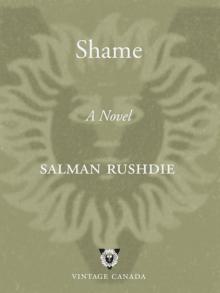 Shame
Shame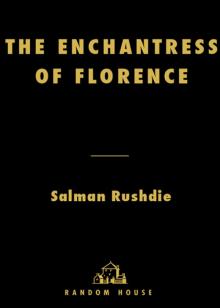 The Enchantress of Florence
The Enchantress of Florence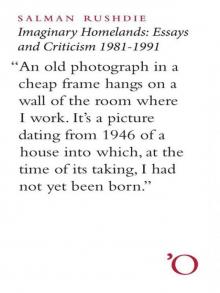 Imaginary Homelands: Essays and Criticism 1981-1991
Imaginary Homelands: Essays and Criticism 1981-1991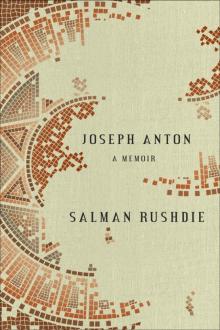 Joseph Anton: A Memoir
Joseph Anton: A Memoir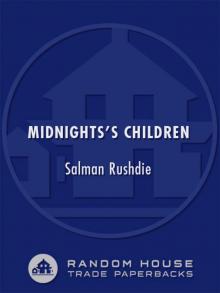 Midnight's Children
Midnight's Children East, West: Stories
East, West: Stories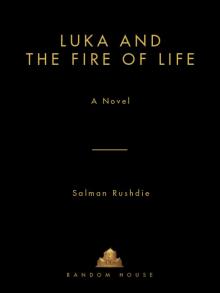 Luka and the Fire of Life
Luka and the Fire of Life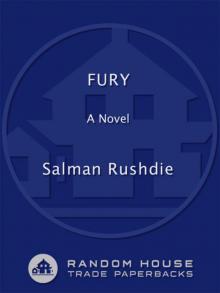 Fury Fury Fury
Fury Fury Fury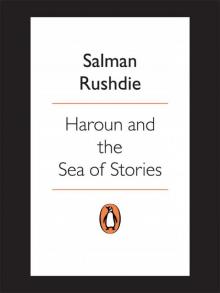 Haroun and the Sea of Stories
Haroun and the Sea of Stories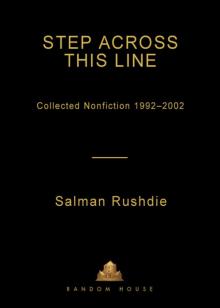 Step Across This Line: Collected Nonfiction 1992-2002
Step Across This Line: Collected Nonfiction 1992-2002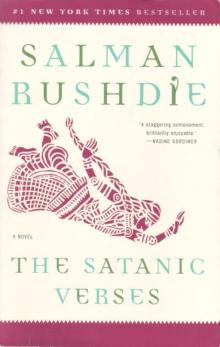 The Satanic Verses
The Satanic Verses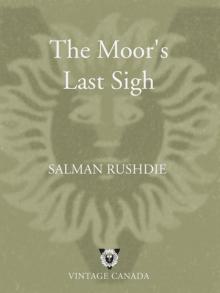 The Moor's Last Sigh
The Moor's Last Sigh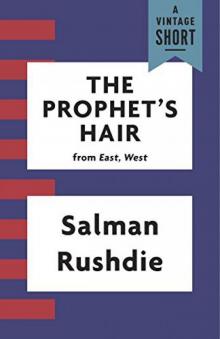 The Prophet's Hair
The Prophet's Hair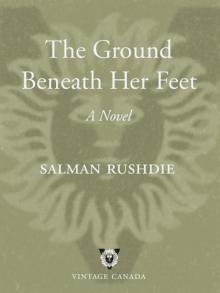 The Ground Beneath Her Feet
The Ground Beneath Her Feet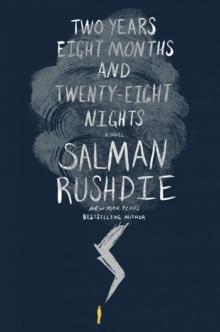 Two Years Eight Months and Twenty-Eight Nights
Two Years Eight Months and Twenty-Eight Nights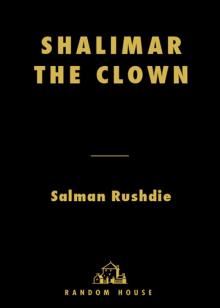 Shalimar the Clown
Shalimar the Clown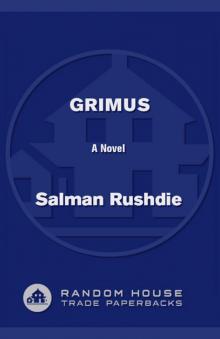 Grimus
Grimus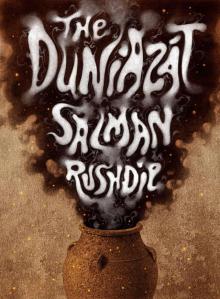 The Duniazát
The Duniazát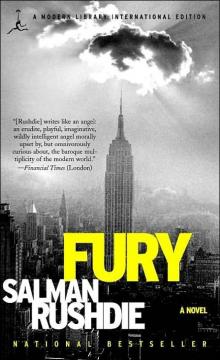 Fury
Fury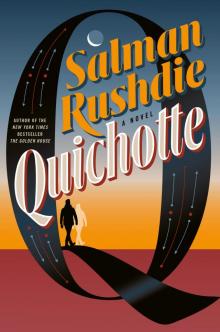 Quichotte
Quichotte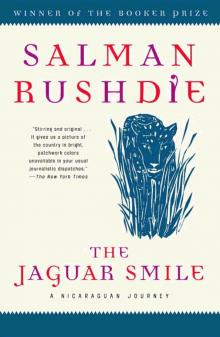 The Jaguar Smile
The Jaguar Smile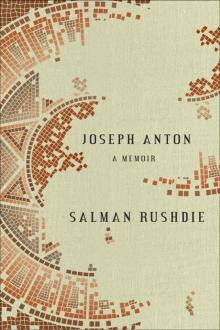 Joseph Anton
Joseph Anton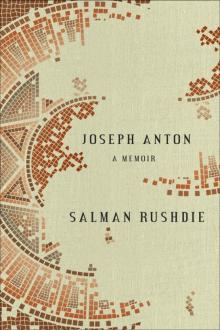 Joseph Anton: A Memoir: A Memoir
Joseph Anton: A Memoir: A Memoir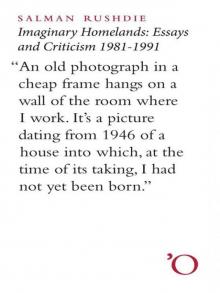 Imaginary Homelands
Imaginary Homelands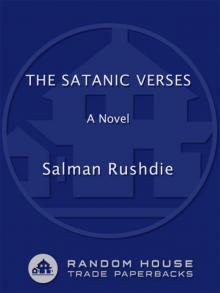 The Satanic Verses: A Novel
The Satanic Verses: A Novel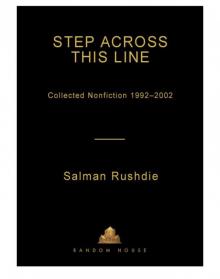 Step Across This Line
Step Across This Line East, West
East, West